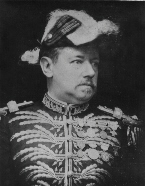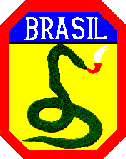History

Gen GIRARD 1st Commander
The history of ECEME originated in the 19th century. The first evidence of general staff activities in Brazil appeared in 1808 in the Court Headquarters where the activities of King João VI´s forces were oriented and coordinated.
Approximately 100 years after that, in 1905, the General Staff College was created (Decree of October 2).
During this stage, Brazilian officers were instructed regularly in strategy, tactics and logistics, essential subjects for the Ground Force, leaving behind many of the thoughts of the previous century.
INFLUENCES

When World War I ended, in 1918, the Brazilian government invited French instructors specialized in military science. The establishment of the French Military Mission provided the professional development. Great merits have been credited to the French military mission, which has engaged heavily in the dissemination of new combat processes, bequeathing even publications on weapons tactics, campaign services and military leadership. The establishment of the mission remained until 1940.
The participation of Brazil in World War II generated profound changes in doctrine, school curriculum , teaching and work methods, as well as the very environment of the Army General Staff College. The return of the last three members from the French military mission and the military agreements with the North Americans decisively contended for these changes to take place. From 1940 on, a new stage began in the trajectory of the School, marked by its definitive installation in the Praia Vermelha building.
OUR CHRONOLOGY
1905 - The General Staff (EEM) College was created, subordinate to the Army General Staff (EME).
1906 - Beginning of operation in the old building of the Ministry of War, in the wing facing the Central do Brazil.
1907 - Provisional installation at the extinct Military School of Brazil, in Praia Vermelha.
1909 - Graduation of the first class; increase of course for three years and inclusion of the teaching of Strategy and Military History.
1916 - Beginning of the participation of civilian and military authorities as lecturers in the School.
1918 - Temporary suspension of school activities as a result of the First World War.
1920 - Restart of activities in the northern wing of the former Ministry of War; beginning of the orientation of the French Military Mission.
1921 - Installation in the building occupied by the First Army Police Battalion on Barão de Mesquita Street.
1940 - Definitive installation in the current building in Praia Vermelha, coinciding with the end of the French Military Mission.
1947 - Creation of the Service Staff Course.
1955 - Change of denomination to Army Command and General Staff College (ECEME).
1964 - IIntroduction of "teaching areas" in the ECEME curriculum.
1965 - Reorganization of ECEME to attend the new teaching system and creation of the ECEME Preparation Course.
1968 - Replacement of teaching areas with teaching sections.
1969 - EME subordination to the Training and Improvement Board (DFA), parto f the Department of Education and Research (DEP) of the Ministry of the Army.
1977 - Beginning of the course of General Staff with duration of two years; first class of the Direction Course for Military Engineers.
1986 - Creation of the Politics, Strategy and Senior Administration Course of the Army (CPEAEx).
1988 - First class of CPEAEx
1996 - IBeginning of the restructuring of the School to adapt to the modernization of the Army Teaching System.
2001 - Implementation of the ECEME Post Graduate Program.
2005 - Celebration of the Centenary of ECEME and Historical denomination of Marechal Castello Branco School;
2006 – Creation of the Management and Advisory Staff Course ;
2012 – Creation of the Meira Mattos Institute;
2015 – Recognition of the Academic Master of the PPGCM by CAPES;
2016 – Implementation of Teaching by competences and restructuring of the School to adapt to this teaching; Recognition of the Academic Doctorate of the PPGCM by CAPES; and
2017 – Transfer of the Management and Advisory Staff Course (CGAEM) to the Escola de Formação Complementar do Exército - EsFCEx (Complementary Formation Army School).

